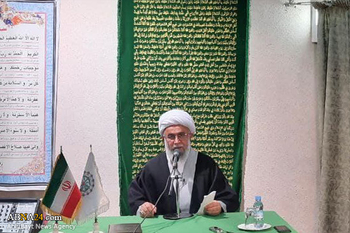By reviving social, governmental status of religion, Imam Khomeini performed miracle: Ayatollah Ramazani
The Secretary-General of the AhlulBayt (a.s.) World Assembly said, “The founder of the Islamic Revolution performed a miracle by reviving the social and governmental status of religion. Through his actions, religion came out of the abandonment and entered the social sphere and became the most important research topics in the world’s major universities.”
In a speech to the staff of the AhlulBayt (a.s.) World Assembly, while condoling the demise of Grand Ayatollah Safi Golpaygani, Ayatollah Reza Ramazani said, “He was a prominent figure in the world of jurisprudence. That eminent scholar left more than 150 works in various scientific subjects, history, Fiqh (jurisprudence), Osul (principles), Tafsir (exegesis of Quran), hadith and many fields of religious knowledge.”
Stating that the 103-year life of Ayatollah Safi has had a profound impact on the field of jurisprudence, the Secretary-General of the AhlulBayt (a.s.) World Assembly added, “He played an important role in the struggle against the tyrannical regime of the Shah and was present in various areas of the Islamic Revolution, such as the drafting of the Constitution, the first Assembly of Leadership Experts, and the Guardian Council. He was a figure who defended the sacred ideals of the Islamic Republic until the last moment of his life.”
“Ayatollah Safi Golpaygani was exemplary in his devotion to the AhlulBayt (a.s.). He takes people to the door of the house of AhlulBayt (a.s.) with his behavior and deeds. Exemplary and praiseworthy humility made him a Marja that everyone who came to him was fascinated by his actions and behavior,” he added.
“When we went to him to report on Shiite issues around the world, he was very happy and always prayed. He was so humble that when he put the turban on an African clergy, quickly kissed the clergy’s hand,” stated the Secretary-General of the AhlulBayt (a.s.) World Assembly.
Emphasizing that Ayatollah Safi Golpayegani was always committed to the ideals of the Revolution, justice, spirituality and rationality, Ayatollah Ramazani added, “The Islamic seminaries lost a pillar of jurisprudence, thw one who was immersed in the love of the AhlulBayt (a.s.). May God unite his soul with the souls of the infallible Imams (a.s.) and grant us all success in enduring this irreparable loss.”
In another part of his speech, while referring to the anniversary of the victory of the Islamic Revolution and the anniversary of the arrival of Imam Khomeini (r.a.) from exile to Iran, the Secretary-General of the AhlulBayt (a.s.) World Assembly said, “Today is Bahman 12 (February 2), the anniversary of the beginning of a movement, a great revolution and transformation.”
“In different historical periods, the relationship between scholars and people has been in different forms. At one time, this relationship was the relationship of a hadith narrator with the people, and religious scholars recited hadith for the people. This relationship evolved in different historical periods and reached a stage where religious scholars became the Marja (source of emulation),” he added.
“Imam Khomeini (r.a.) promoted this relationship, and the relationship between Ulama and people became the Imamate-ummah relationship. Imam Khomeini (r.a.) believed in his nation,” Ayatollah Ramazani continued.
Stating that before the Islamic Revolution, religion did not appear in the social arena and did not play a role, the representative of the people of Gilan in the Assembly of Experts said, “At that time, in the scientific centers of the world, such as the Sorbonne, Harvard, Cambridge, Oxford, etc., religion was not a serious matter. Rather, the perception of religion was an individual matter. At that time, Hajj was for certain people. Very old people went to Hajj, and they only paid attention to their worshipping duties of the religion (not social duties). At that time, there was no Disavowal of Polytheists in Hajj and the exchange of culture, information, and new approaches and awakenings. At that time, although people participated in the Majalis of Imam Hussain (a.s.), but these gatherings did not affect the social role of the people.”
“At that time, religion had no place in the scientific centers of the country, and if anyone prayed in the university, he was considered reactionary and backward. The abandonment of religion was evident in the social sphere, and the fact that religion appears with the position of government in society did not even come to anyone's dream,” he said.
“Imam Khomeini extracted the issue of Velayat-e-Faqih from the jurisprudential debates, and from that jurisprudential point of view, he took a theological view of the Velayat-e-Faqih, that is, the view of Imamate and leadership in the Islamic society. Jurisprudence is the practical philosophy of government. Imam Khomeini revived the social status of religion. The seminaries also did not think that such a platform would be provided so that the jurists could comment on world arenas and important issues,” Ayatollah Ramazani emphasized.
“At that time, jurisprudence and religion were so abandoned that the theorists of the world believed that no religious revolution would take place in the world, because liberalism has ruled the world. But the founder of the Islamic Revolution performed a miracle by reviving the social and governmental status of religion. Religion emerged from abandonment and entered society, becoming one of the most important research topics in the world’s major universities,” stated the Secretary-General of the AhlulBayt (a.s.) World Assembly.
The Secretary-General of the AhlulBayt (a.s.) World Assembly said, “The founder of the Islamic Revolution performed a miracle by reviving the social and governmental status of religion. Through his actions, religion came out of the abandonment and entered the social sphere and became the most important research topics in the world’s major universities.”
In a speech to the staff of the AhlulBayt (a.s.) World Assembly, while condoling the demise of Grand Ayatollah Safi Golpaygani, Ayatollah Reza Ramazani said, “He was a prominent figure in the world of jurisprudence. That eminent scholar left more than 150 works in various scientific subjects, history, Fiqh (jurisprudence), Osul (principles), Tafsir (exegesis of Quran), hadith and many fields of religious knowledge.”
Stating that the 103-year life of Ayatollah Safi has had a profound impact on the field of jurisprudence, the Secretary-General of the AhlulBayt (a.s.) World Assembly added, “He played an important role in the struggle against the tyrannical regime of the Shah and was present in various areas of the Islamic Revolution, such as the drafting of the Constitution, the first Assembly of Leadership Experts, and the Guardian Council. He was a figure who defended the sacred ideals of the Islamic Republic until the last moment of his life.”
“Ayatollah Safi Golpaygani was exemplary in his devotion to the AhlulBayt (a.s.). He takes people to the door of the house of AhlulBayt (a.s.) with his behavior and deeds. Exemplary and praiseworthy humility made him a Marja that everyone who came to him was fascinated by his actions and behavior,” he added.
“When we went to him to report on Shiite issues around the world, he was very happy and always prayed. He was so humble that when he put the turban on an African clergy, quickly kissed the clergy’s hand,” stated the Secretary-General of the AhlulBayt (a.s.) World Assembly.
Emphasizing that Ayatollah Safi Golpayegani was always committed to the ideals of the Revolution, justice, spirituality and rationality, Ayatollah Ramazani added, “The Islamic seminaries lost a pillar of jurisprudence, thw one who was immersed in the love of the AhlulBayt (a.s.). May God unite his soul with the souls of the infallible Imams (a.s.) and grant us all success in enduring this irreparable loss.”
In another part of his speech, while referring to the anniversary of the victory of the Islamic Revolution and the anniversary of the arrival of Imam Khomeini (r.a.) from exile to Iran, the Secretary-General of the AhlulBayt (a.s.) World Assembly said, “Today is Bahman 12 (February 2), the anniversary of the beginning of a movement, a great revolution and transformation.”
“In different historical periods, the relationship between scholars and people has been in different forms. At one time, this relationship was the relationship of a hadith narrator with the people, and religious scholars recited hadith for the people. This relationship evolved in different historical periods and reached a stage where religious scholars became the Marja (source of emulation),” he added.
“Imam Khomeini (r.a.) promoted this relationship, and the relationship between Ulama and people became the Imamate-ummah relationship. Imam Khomeini (r.a.) believed in his nation,” Ayatollah Ramazani continued.
Stating that before the Islamic Revolution, religion did not appear in the social arena and did not play a role, the representative of the people of Gilan in the Assembly of Experts said, “At that time, in the scientific centers of the world, such as the Sorbonne, Harvard, Cambridge, Oxford, etc., religion was not a serious matter. Rather, the perception of religion was an individual matter. At that time, Hajj was for certain people. Very old people went to Hajj, and they only paid attention to their worshipping duties of the religion (not social duties). At that time, there was no Disavowal of Polytheists in Hajj and the exchange of culture, information, and new approaches and awakenings. At that time, although people participated in the Majalis of Imam Hussain (a.s.), but these gatherings did not affect the social role of the people.”
“At that time, religion had no place in the scientific centers of the country, and if anyone prayed in the university, he was considered reactionary and backward. The abandonment of religion was evident in the social sphere, and the fact that religion appears with the position of government in society did not even come to anyone's dream,” he said.
“Imam Khomeini extracted the issue of Velayat-e-Faqih from the jurisprudential debates, and from that jurisprudential point of view, he took a theological view of the Velayat-e-Faqih, that is, the view of Imamate and leadership in the Islamic society. Jurisprudence is the practical philosophy of government. Imam Khomeini revived the social status of religion. The seminaries also did not think that such a platform would be provided so that the jurists could comment on world arenas and important issues,” Ayatollah Ramazani emphasized.
“At that time, jurisprudence and religion were so abandoned that the theorists of the world believed that no religious revolution would take place in the world, because liberalism has ruled the world. But the founder of the Islamic Revolution performed a miracle by reviving the social and governmental status of religion. Religion emerged from abandonment and entered society, becoming one of the most important research topics in the world’s major universities,” stated the Secretary-General of the AhlulBayt (a.s.) World Assembly.






